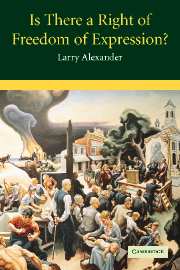Book contents
- Frontmatter
- Contents
- Acknowledgments
- Introduction
- PART ONE DEFINING HUMAN RIGHTS AND DELIMITING THE SCOPE OF FREEDOM OF EXPRESSION
- PART TWO THE CORE OF FREEDOM OF EXPRESSION: GOVERNMENT REGULATIONS AND ACTS TAKEN TO AFFECT MESSAGES
- PART THREE THEORETICAL PERSPECTIVES ON FREEDOM OF EXPRESSION
- EPILOGUE
- 9 Muddling Through: Freedom of Expression in the Absence of a Human Right
- Index
9 - Muddling Through: Freedom of Expression in the Absence of a Human Right
Published online by Cambridge University Press: 07 January 2010
- Frontmatter
- Contents
- Acknowledgments
- Introduction
- PART ONE DEFINING HUMAN RIGHTS AND DELIMITING THE SCOPE OF FREEDOM OF EXPRESSION
- PART TWO THE CORE OF FREEDOM OF EXPRESSION: GOVERNMENT REGULATIONS AND ACTS TAKEN TO AFFECT MESSAGES
- PART THREE THEORETICAL PERSPECTIVES ON FREEDOM OF EXPRESSION
- EPILOGUE
- 9 Muddling Through: Freedom of Expression in the Absence of a Human Right
- Index
Summary
In the previous chapters we have searched in vain for an argument that would support a human right of freedom of expression. Although there may be a case for a presumption in favor of liberty of action – a case that we did not seek to establish – such a presumption, should it exist, is both far too broad in scope and far too weak to support a recognizable human right of freedom of expression. It is far too broad because liberty of action comprehends much more than expression. And it is far too weak because it takes only a legitimate governmental interest to overcome it.
A more robust liberty, one worthy of being called a human right, that is at the same time restricted to expression, lacks any theoretical grounding. In Chapter Seven we saw that candidate consequentialist and deontological theories for a special right of freedom of expression are inadequate to the task. And in Chapter Eight, we saw the source of the problem: Evaluative neutrality is the hallmark of freedom of expression, but no moral theory can support evaluative neutrality without generating a paradox. Any moral theory will deem certain states of affairs to be desirable and demanding of legal promotion, and certain interests to be demanding of legal protection from acts that threaten those interests.
- Type
- Chapter
- Information
- Is There a Right of Freedom of Expression? , pp. 185 - 194Publisher: Cambridge University PressPrint publication year: 2005



